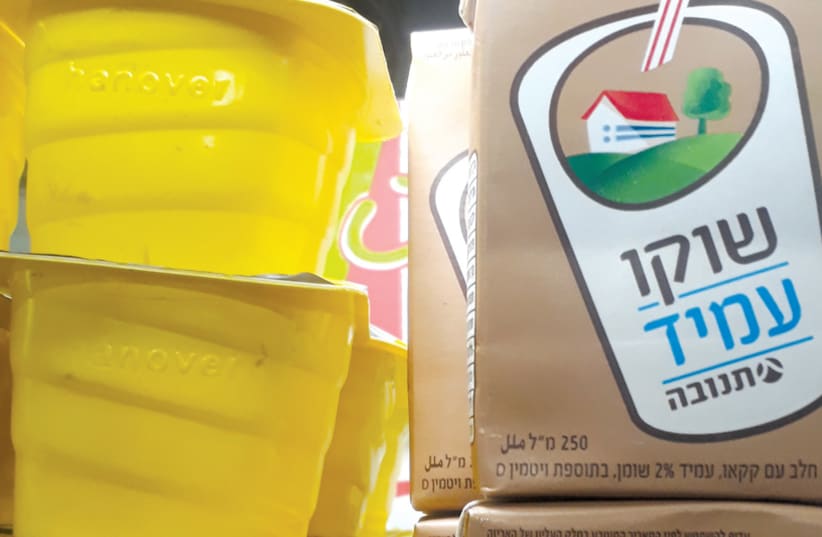Difficulties in the Gaza Strip are being exploited by a number of special interest groups inside Gaza that are doing everything in their power to deceive the vulnerable residents there. The latest scandal deals with food. It began when Gaza’s government food inspectors filed a lawsuit against Badri & Hania Co. The inspectors had seized four tons of coffee, spices and raw materials whose expiration had passed, just before they were to be distributed to stores across the Gaza Strip.
As happens after each new crisis in the food industry in Gaza, consumers began the inevitable comparisons between food items that are produced in Gaza with products brought in from Israel.
Angry responses to the latest swindle soon began appearing on local residents’ Facebook pages. These included calls to buy Israeli-made products as long as Palestinian-made products do not meet the high standards the Palestinian government has committed itself to following.
In fact, just this week, Rola Ravi, 37, strolled into a large supermarket in the center of Gaza, whose shelves hold a large variety of Israeli products. She happily purchased a jar of Israeli Elite coffee. When asked why she bought an Israeli-made product, she responded by saying she prefers Israeli products because of their higher quality, and because she feels secure in knowing they meet certain standards.
“For 10 years I drank my favorite brand of locally produced coffee, Badri & Hania,” explained Ravi. “But recently, there was a problem. The company has been charged with forging production and expiration dates on their products. As a result, I’ve lost all faith in locally produced food items. I prefer to pay a little more for Israeli products. For example, I used to buy the 250-gram jar of the local Palestinian-made coffee for 10 shekels. Now I’m spending eight shekels for a 100-gram jar of Elite coffee. Quality is important to me.”
Another consumer, Suheil Moyad, 65, asked why he purchased Israeli-made milk for his nine-month-old grandson, said, “I prefer buying the Israeli milk for my grandson because I think it’s more sterile and safer to use. I don’t buy locally made food products because I’m always hearing about how Palestinian companies cut corners and ignore safety standards. There’s no supervision or quality control in local factories and this harms quality.”
Some 20 years ago, Moyad worked as a mechanic at a garage in Tel Aviv. “When I was working in Israel, I saw that factories there uphold certain standards,” he said. “Israeli products therefore are higher quality, cleaner and safer. They also taste good. People want to buy quality products.”
High quality is not the only reason why Gazans prefer Israeli products over locally produced items. Many deficiencies have been found in local products.
“WHEN ISRAELI products were boycotted a few years ago, I happily joined this movement as a way to express my Palestinian patriotism,” recalled Tomer Abu-Daya, 34. “But then, one day, when I was eating a cookie, I bit into a huge chunk of salt that apparently hadn’t dissolved during the production process. From that moment on, I decided to stop boycotting Israeli products, because they’re much higher quality than locally made products.”
Muntar Zuhair, 55, a factory owner, confirmed that the main problem with local products is a lack of supervision in factories throughout the Gaza Strip. “These factories violate the quality standards because the Palestinian Ministry of Economy does not carry out any supervision. As a result, Palestinian products have an extremely poor reputation. So, people are worried that our products lack quality and they don’t buy them.”
Alaa Shorab, who owns a supermarket, said people buy more Israeli products than they do locally made items, despite their being more expensive. Shorab claimed that wealthier customers buy Israeli products only, and he has a hard time keeping the shelves stocked with those products. Customers especially like Israeli coffee, ice cream, potato chips and dairy products, he said.
The chief reason for the large discrepancy in prices is that stiff tariffs are imposed by the Gaza Economy Ministry on all Israeli products entering Gaza. It is part of an effort to promote the sale of locally made products.
Samiya Wadi, 40, a homemaker, would love to purchase Israeli food products, but said, sadly, she cannot afford them. Wadi has a hard time acquiring the money she needs to feed her seven-person family, despite a subsidy she receives from the Palestinian Welfare Ministry. These government funds are transferred only once every three months from the Palestinian government in Ramallah, which is led by Mahmoud Abbas.
According to the Gaza Economy Ministry, Israeli products account for 65% of all items imported into Gaza. These items are transported into Gaza through the Kerem Shalom border crossing, the only place commercial vehicles are allowed access to and from Gaza. In other words, Kerem Shalom is the only commercial contact Gaza has with the outside world. Today, Israel allows virtually all products into the Gaza Strip, except for materials that have double usage and could be used for military purposes.
More than 1,000 trucks pass through the crossing every day (not counting fuel tankers). Prior to 2010, when Israel eased limitations at the Kerem Shalom crossing, only 150 trucks a day were allowed to enter.
According to a report published by the Gaza Ministry of Economy, the Gaza Strip imports almost everything it consumes, paying some three billion dollars in customs tariffs per year. Gaza is Israel’s largest export market. Gazan economists believe that local Palestinian industry was weakened by the Paris Protocol (the economic annex of the Oslo Accords), which stipulated that 75% of Palestinian imports must come from Israel. And yet, despite the heavy tariffs, there has been no increase in sales of locally produced items.
Translated by Hannah Hochner.
